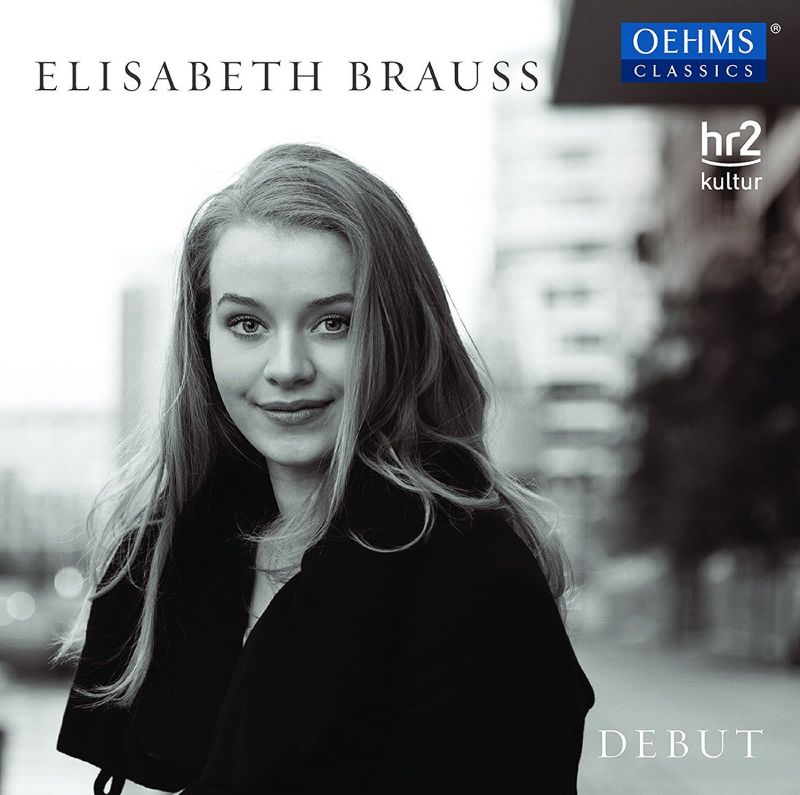Elisabeth Brauss: Debut
View record and artist detailsRecord and Artist Details
Composer or Director: Fryderyk Chopin, Michael Denhoff, Sergey Prokofiev, Ludwig van Beethoven
Genre:
Instrumental
Label: Oehms
Magazine Review Date: 08/2017
Media Format: CD or Download
Media Runtime: 74
Mastering:
DDD
Catalogue Number: OC460

Tracks:
| Composition | Artist Credit |
|---|---|
| Sonata for Piano No. 7 |
Ludwig van Beethoven, Composer
Elisabeth Brauss, Piano Ludwig van Beethoven, Composer |
| Sonata for Piano No. 2 |
Sergey Prokofiev, Composer
Elisabeth Brauss, Piano Sergey Prokofiev, Composer |
| Sonata for Piano No. 2, 'Funeral March' |
Fryderyk Chopin, Composer
Elisabeth Brauss, Piano Fryderyk Chopin, Composer |
| Etude de couleurs |
Michael Denhoff, Composer
Elisabeth Brauss, Piano Michael Denhoff, Composer |
Author: Patrick Rucker
Perhaps the most impressive aspect of this Beethoven D major Sonata is Brauss’s immense stylistic assurance. The opening Presto is fleet-footed without sounding pressured or rushed. Details are given their full due, from fermatas held not a second too long to delicate equilibrium maintained in the smallest phrase. Every gesture seems imbued with meaning and the whole motivated by an abundance of joy, with sly wit twinkling through from time to time. The tragic scena unfolding during the course of the Largo e mesto has all the more impact for its classically proportioned restraint. Brauss prepares and builds the movement’s climactic peak with consummate skill, lending the whispered final chords an all but unbearably desolate resignation. Never was a Minuet more welcome, and particularly this one with its exuberant Trio. The exquisite Rondo seems ebullient in the realisation that, the hard work accomplished, music may now run free.
Throughout the bristling rhythmic vitality, tricky voice-leading and constantly shifting harmonic colours of Prokofiev’s Second Sonata, Brauss never loses sight of the composer’s fundamental lyric impulse. She is also fully cognisant of the kinaesthetic sense that enabled Prokofiev to compose so effectively for the dance. When Prokofiev wants to raise a great noise, Brauss happily complies, just as, in the Scherzo for instance, she is able to generate a tightly wound, unstoppable motoric impulse. Embarking on the dark waters of the Andante is certainly mysterious but one feels a compass always at hand. Mocking parody and gaudy colours are woven into the circus antics of the finale, even as it scurries on its madcap course to an implacable cadence. Calling Brauss’s Prokofiev civilised would imply that it is somehow tamed, which is not the case. Better said, it is Prokofiev without brutality.
This passionate B flat minor Sonata occasionally verges on despair, redeemed always by the eloquence of Chopin’s rhetoric. The Scherzo’s volte-face to the Trio is a small miracle of characterisation. When the Trio is recalled at the end of the movement, it is suddenly recognisable as a portent of the Marche funèbre. Hushed restraint pervades that sad journey, funeral tolls heard from a distance. Out of this sombre cortège emanates a Trio that, in its ethereal poise, could be an aural avatar of Marie Taglioni’s appearance at the Paris Opéra ballet as the first Sylphide. The Presto finale conjures an apparition, indifferent to all that has transpired, its flight more felt than glimpsed, until its final dive brings the sonata to a defiant conclusion.
It is rare to encounter this degree of instrumental mastery wed to musical depth and sensitivity in one so young. Brauss’s exhilarating Beethoven is so thoroughly integrated that each movement is emotionally and spiritually amplified by what has gone before. Her original and unaffected Chopin-playing is fresh and a joy to listen to. If you find yourself uncertain about the future of the art of piano-playing, listening to Elisabeth Brauss could be the antidote.
Discover the world's largest classical music catalogue with Presto Music.

Gramophone Digital Club
- Digital Edition
- Digital Archive
- Reviews Database
- Full website access
From £8.75 / month
Subscribe
Gramophone Full Club
- Print Edition
- Digital Edition
- Digital Archive
- Reviews Database
- Full website access
From £11.00 / month
Subscribe
If you are a library, university or other organisation that would be interested in an institutional subscription to Gramophone please click here for further information.




